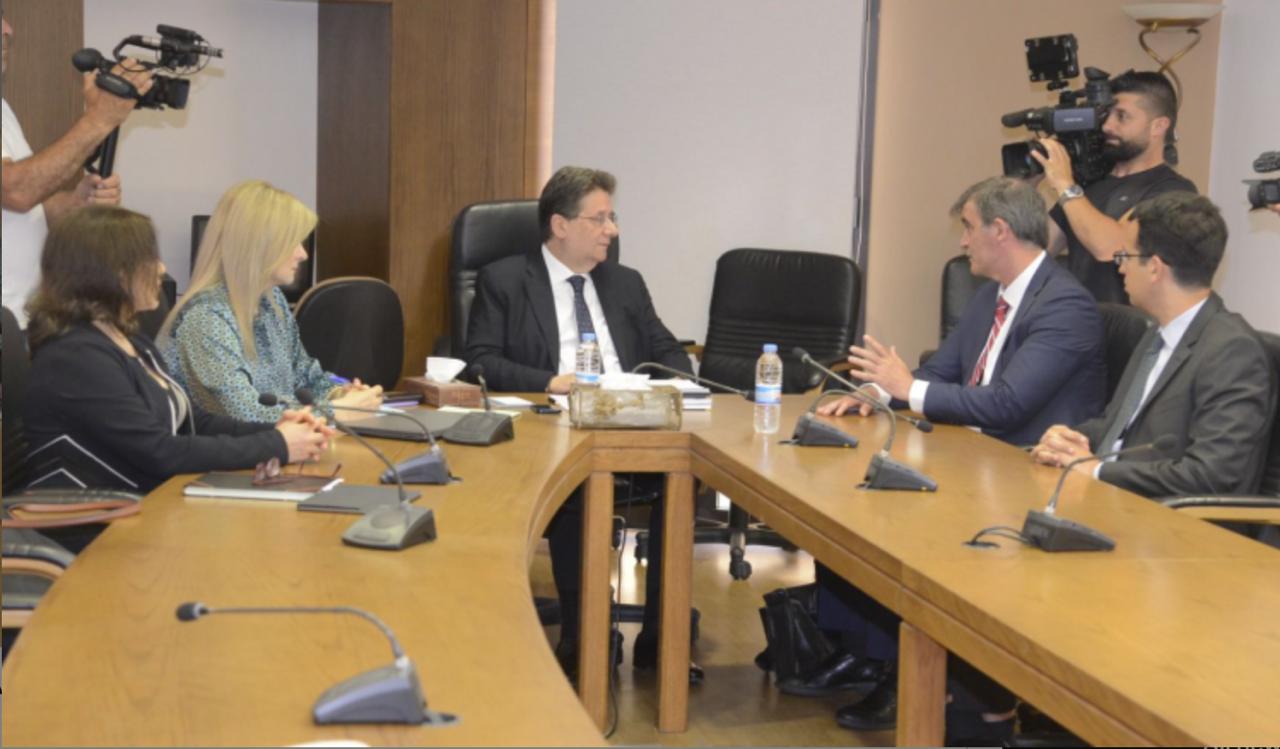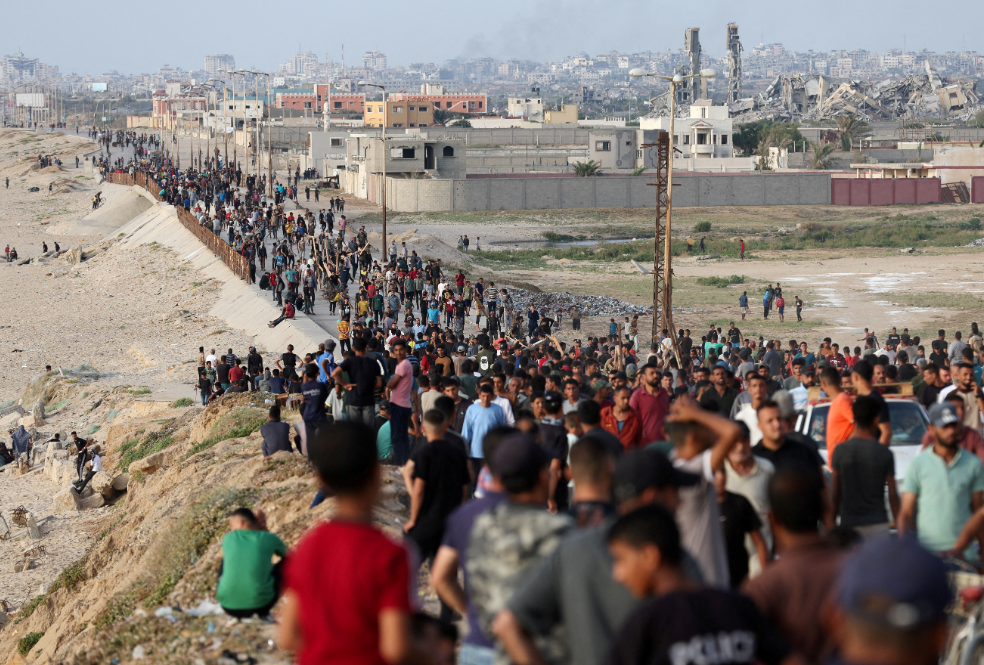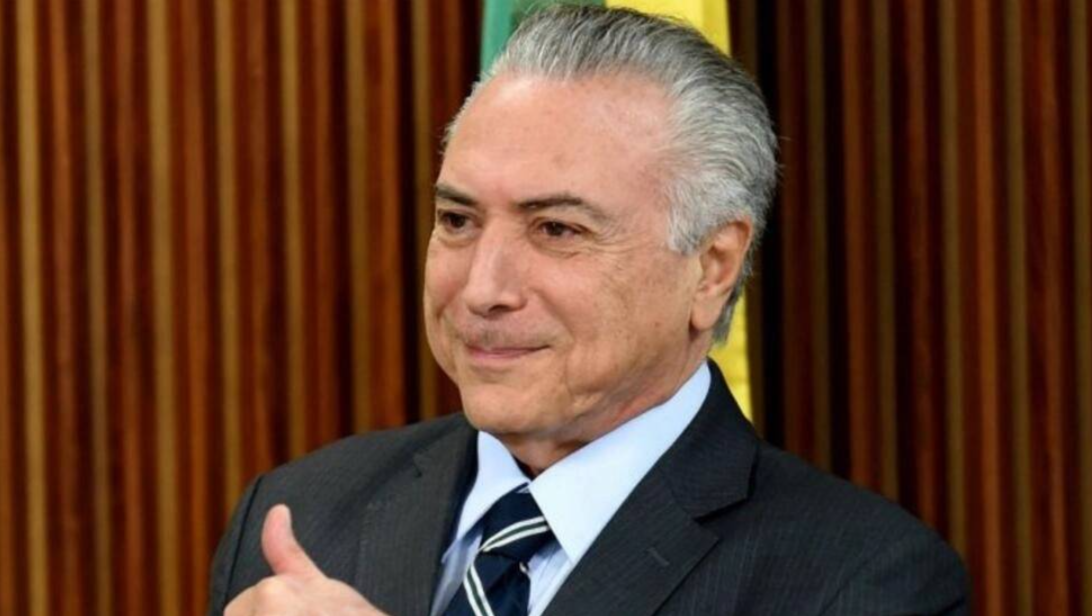
Want to get the Morning Brief by email? Click here to sign up.
Friday, May 24, 2024.
Compiled by Abbas Mahfouz.

 Some key things to watch today:
Some key things to watch today:
• At 4 p.m. Beirut time, the International Court of Justice (ICJ) is set to rule on South Africa’s request for an “immediate” cease-fire in Gaza
• Hezbollah leader, Hassan Nasrallah, will speak at 17:00 Beirut time.

 A Lebanese driver clears the glass of the smashed windshield of a school bus that was passing a car of a Hezbollah fighter which was targeted by an Israeli drone strike on a road leading to the southern Lebanese city of Nabatieh on May 23, 2024. (Credit: Mahmoud Zayyat/AFP)
A Lebanese driver clears the glass of the smashed windshield of a school bus that was passing a car of a Hezbollah fighter which was targeted by an Israeli drone strike on a road leading to the southern Lebanese city of Nabatieh on May 23, 2024. (Credit: Mahmoud Zayyat/AFP)
 SOUTH LEBANON: Children in school bus injured by Israeli attack on Nabatieh
SOUTH LEBANON: Children in school bus injured by Israeli attack on Nabatieh
“Three of the children on board were bleeding, while the others were screaming,” the driver told the state-run National News Agency. The children were in the vicinity of an Israeli drone strike that killed a physics teacher. The Israeli army claimed he was a member of Hezbollah's weapons manufacturing team. The principal of the Hassan Kamel al-Sabbah High School, where the deceased taught, told L’Orient Today they had “no idea of his personal life or other commitments,” describing him as “polite and creative.”
Hezbollah responds, bilateral cross-border strikes continue: The party responded to the attack in Nabatieh by firing dozens of rockets at an Israeli military post, which came amid a volley of other strikes claimed by the party. Israel continued to unload an arsenal of aerial bombing, drone strikes, artillery shells, and incendiary balloons across southern Lebanon.
Education “catastrophe” and “assault on childhood,” Elementary School Teachers' Union says. Earlier this month, the United Nations Children’s Fund (UNICEF) warned of the consequences of cross-border fighting on access to healthcare, noting a surge in vaccine-preventable diseases and malnutrition, and significant effects on the education of roughly 20,000 students. UNICEF estimates that a third of the more than 92,000 people displaced from southern Lebanon are children and that fighting forced 70 schools to shut down.
Israeli attacks on civilians and children: Israeli strikes have repeatedly killed children either around or in their direct line of fire. Earlier this month, a civilian family, including a 12-year-old child, was killed in their home by an Israeli attack targeting their building. In February, 10 civilians were killed in their homes in similar attacks. Israel’s attacks on medical personnel, journalists and those not engaged in fighting have prompted Lebanon to file several complaints to the UN and has sparked condemnation from international actors over insufficient measures to mitigate harm to civilians. Last month, Israeli press reported that Israel’s military authorized artificial intelligence-guided strikes in Gaza which allowed for the killing of more than a hundred civilians when targeting Hamas officials. Last week a member of Israel's legal team at the International Court of Justice, Tamar Kaplan-Tourgeman, said that “Israel takes extraordinary measures in order to minimize the harm to civilians in Gaza."

 Meeting between an IMF delegation and MP Ibrahim Kanaan in the Lebanese Parliament on May 22. (Credit: NNA)
Meeting between an IMF delegation and MP Ibrahim Kanaan in the Lebanese Parliament on May 22. (Credit: NNA)
 ECONOMY: International Monetary Fund (IMF) delegation concludes Lebanon visit
ECONOMY: International Monetary Fund (IMF) delegation concludes Lebanon visit
Some progress, but not “what is needed to enable a recovery from the crisis,” chief delegate Ernesto Ramirez Rigo: Rigo noted positive effects, including slowed inflation and increased Banque du Liban (BDL) foreign currency reserves, resulting from central bank and finance ministry policies that helped stabilize the lira-to-dollar exchange rate. For example, policies such as setting taxes at the parallel market rate and halting loans from BDL to the government. The delegate noted that progress has yet to be made regarding reforms set since 2022 by the IMF, which Lebanon must undertake in order to unlock a multi-billion dollar aid package.
What’s still to be done? The Staff-Level Agreement between Lebanon and the IMF stipulated a restructuring of the financial sector to return banks’ viability, fiscal reforms and the restructuring of foreign debt, reforms to state-owned enterprises (particularly Electricité du Liban), strengthened anti-corruption and anti-money laundering measures and setting a credible and transparent exchange system.
In the IMF’s words: Lebanon is facing “an increasingly cash-based and informal economy and larger risks of illicit activities” while “bank deposits remain frozen, and the banking sector is unable to provide credit to the economy.” A proposed Bloomberg-designed exchange rate platform was announced though what progress has since been made remains uncertain.
IMF and BDL agree – no loans to the government without reforms. When BDL governor Wassim Mansouri came into office last July he announced his intent at parsimony regarding lending money to the government – refusing to disburse funds not associated with reforms. His approach was aimed at establishing a unified, free-floating exchange rate, ordaining the restructuring of the banking sector, and implementing laws regulating informal capital controls. Foreign reserves have increased since Mansouri took over, despite an overall decline over the previous year – with a prolonged policy of subsidizing foreign exchange through its Sayrafa rate.
To what extent has the new BDL leadership actually contributed to the “yes” in the IMF’s “yes, but…”? Read L’Orient-Le Jour economy reporter Mounir Younes’ analysis here.

 Palestinians gather in the hope of obtaining aid delivered into Gaza through a US-built pier, as seen from central Gaza Strip, May 19, 2024. (Credit: Ramadan Abed/Reuters)
Palestinians gather in the hope of obtaining aid delivered into Gaza through a US-built pier, as seen from central Gaza Strip, May 19, 2024. (Credit: Ramadan Abed/Reuters)
 GAZA: At least 35,709 people killed in Gaza since Oct. 7
GAZA: At least 35,709 people killed in Gaza since Oct. 7
Rafah: The Israeli army reinforced its deployment to Rafah, Israel’s defense minister announced. Its initial ground invasion from the east displaced 800,000 people who had taken shelter in the southernmost city. Gaza’s Civil Defense reported the deaths of 26 people in strikes on homes, a mosque and a school in Gaza City as fighting reignites in areas to the north and center of the enclave. The Israeli army claims it is clearing areas from Hamas militants and that its strikes aim to quell the group’s resurgence. Yesterday the UN said that its food distribution in Rafah had been suspended due to a lack of supplies and insecurity, adding that its distribution center was now inaccessible because of the ongoing Israeli military operation against Hamas in eastern Rafah.
Further negotiations for a cease-fire approved by Israel’s war cabinet: While hostage release terms seemed to harmonize between Israel and Hamas, they have been unable to reconcile the group’s demand for an indefinite truce and complete Israeli withdrawal.

 In other news:
In other news:
• French President Emmanuel Macron and Saudi Crown Prince Mohammad Bin Salman expressed determination to quell fighting between Hezbollah and Israel

 Here is our must-read story from yesterday: New World Bank report reveals one in every three Lebanese lives in poverty
Here is our must-read story from yesterday: New World Bank report reveals one in every three Lebanese lives in poverty
By the World Bank’s estimate, using household consumption and expenditure data collected in 2022, covering “60 percent of the population,” one in three people in Lebanon lived on less than $3 per day.

 Your daily 'light read'
Your daily 'light read'
 Former President of Brazil Michel Temer is of Lebanese descent, June 15, 2016. (Credit: AFP)
Former President of Brazil Michel Temer is of Lebanese descent, June 15, 2016. (Credit: AFP)
On the heels of Dominicans’ re-election of Luis Abinader on Sunday, L’Orient Today reporter Sally Abou AlJoud compiled a list of key figures of Lebanese descent who have risen to prominence in global politics.

Before you go!
Have a suggestion, feedback, or a kind word? You can write to us at this address: editor@lorientlejour.com
